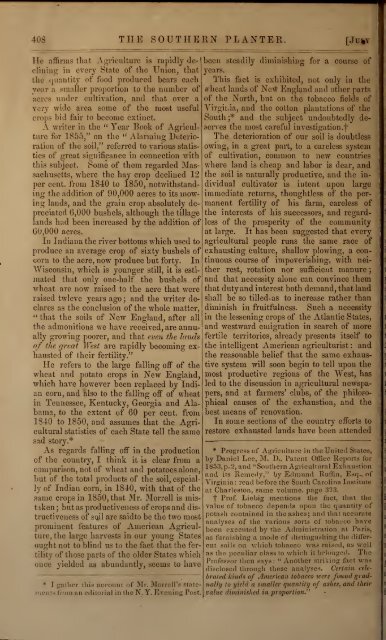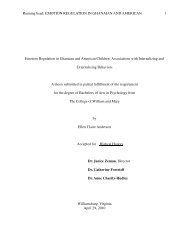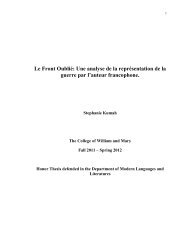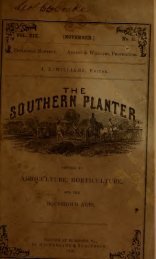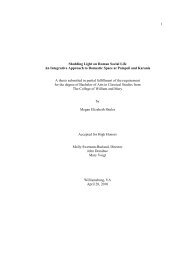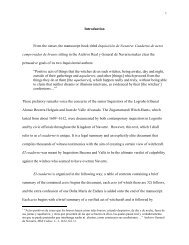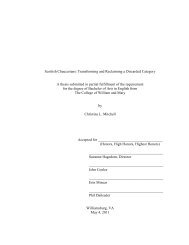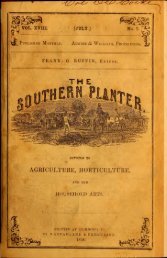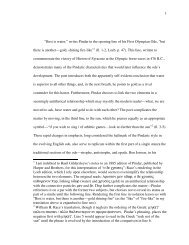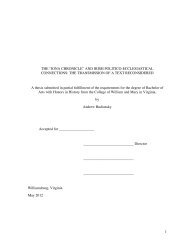Southern planter - The W&M Digital Archive
Southern planter - The W&M Digital Archive
Southern planter - The W&M Digital Archive
You also want an ePaper? Increase the reach of your titles
YUMPU automatically turns print PDFs into web optimized ePapers that Google loves.
408 THE SOUTHERN PLANTER. [JU*Y<br />
He affirms that Agriculture is rapidly declining<br />
in every State of the Union, that<br />
the quantity of food produced bears each<br />
year a smaller proportion to the number of<br />
acres under cultivation, and that over a<br />
very wide area some of the most useful<br />
crops bid fair to become extinct.<br />
A writer in the " Year Rook of Agriculture<br />
for 1855," on the " Alarming Deterio-<br />
ration of the soil," referred to various statis-<br />
tics of great significance in connection with<br />
this subject, Some of them regarded Massachusetts,<br />
where the hay crop declined 12<br />
per cent, from 1840 to 1850, notwithstanding<br />
the addition of 90,000 acres to its mowing<br />
lands, and the grain crop absolutely de-<br />
preciated 6,000 bushels, although the tillage<br />
lands hud been increased by the addition of<br />
60,000 acres.<br />
In Indiana the river bottoms which used to<br />
produce an average crop of sixty bushels of<br />
corn to the acre, now produce but forty. In<br />
Wisconsin, which is younger still, it is estimated<br />
that only one-half the bushels of<br />
wheat are now raised to the acre that were<br />
raised twleve years ago ; and the writer de-<br />
clares as the conclusion of the whole matter,<br />
" that the soils of New England, after all<br />
the admonitions we have received, are annu-<br />
ally growing poorer, and that even the lands<br />
of the great West are rapidly becoming exhausted<br />
of Iheir fertility."<br />
He refers to the large falling off of the<br />
wheat and potato crops in New England,<br />
which have however been replaced by Indian<br />
corn, and also to the falling off of wheat<br />
in Tennessee, Kentucky, Georgia and Alabama,<br />
to the extent of 60 per cent, from<br />
1840 to 1850, and assumes that the Agricultural<br />
statistics of each State tell the same<br />
sad story.*<br />
As regards falling off in the production<br />
of the country, I think it is clear from a<br />
comparison, not of wheat and potatoes alone,<br />
but of the total products of the soil, espcial-<br />
ly of Indian corn, in 1840, with that of the<br />
same crops in 1850, that Mr. Morrell is mistaken;<br />
but as productiveness of crops and distructiveness<br />
of soil are saidto be the two most<br />
prominent features of American Agricul-<br />
ture, the large harvests in our young States<br />
ought not to blind us to the fact that the fertility<br />
of those parts of the older States which<br />
once yielded as abundantly, seems to have<br />
* I gather this account of Mr. Morrell's state-<br />
ments from an editorial in the N. Y. Evening Post.<br />
been steadily diminishing for a course of<br />
years.<br />
This fact is exhibited, not only in the<br />
wheat lands of New England and other parts<br />
of the North, but on. the tobacco fields of<br />
Virginia, and the cotton plantations of the<br />
South;* and the subject undoubtedly de-<br />
serves the most careful investigation .f<br />
<strong>The</strong> deterioration of our soil is doubtless<br />
owing, in a great part, to a careless system<br />
of cultivation, common to new countries<br />
where land is cheap and labor is dear, and<br />
the soil is naturally productive, and the in-<br />
dividual cultivator is intent upon large<br />
immediate returns, thoughtless of the permanent<br />
fertility of his farm, careless of<br />
the interests of his successors, and regardless<br />
of the prosperity of the community<br />
at large. It has been suggested that every<br />
agricultural people runs the same race of<br />
exhausting culture, shallow plowing, a con-<br />
tinuous course of impoverishing, with neither<br />
rest, rotation nor sufficient manure<br />
and that necessity alone can convince them<br />
that duty and interest both demand, that land<br />
shall be so tilled- as to increase rather than<br />
diminish in fruitfulness. Such a necessity<br />
in the lessening crops of the Atlantic States,<br />
and westward emigration in search of more<br />
fertile territories, already presents itself to<br />
the intelligent American agriculturist : and<br />
the reasonable belief that the same exhaustive<br />
system will soon begin to tell upon the<br />
most productive regions of the West, has<br />
led to the discussion in agricultural newspa-<br />
pers, and at farmers' clubs, of the philosophical<br />
causes of the exhaustion, and the<br />
best means of renovation.<br />
In some sections of the country efforts to<br />
restore exhausted lands have been attended<br />
* Progress of Agriculture in the United States,<br />
by Daniel Lee, M. D., Patent Office Reports for<br />
1853,p.2, and "<strong>Southern</strong> Agricultural Exhaustion<br />
and its Remedy,''' by Edmund Ruffin, Esq., of<br />
Virginia: read before the South Carolina Institute<br />
at Charleston, same volume, page 373.<br />
"j" Prof. Liebig mentions the fact, that the<br />
value of tobacco depends upon the quantity of<br />
potash contained in the ashes; and that accurate<br />
analyses of the various sorts of tobacco have<br />
been executed by the Administration at. Paris,<br />
as furnishing a mode of distingushing the different<br />
soils on which tobacco was raised, as well<br />
as the peculiar class to which it belonged. <strong>The</strong><br />
Professor then says: "Another striking fact was<br />
disclosed through these analyses. Certain celebrated<br />
kinds of American tobacco were found gradually<br />
to yield a smaller quantity of ashes, and their<br />
value diminished in proportion." 1


